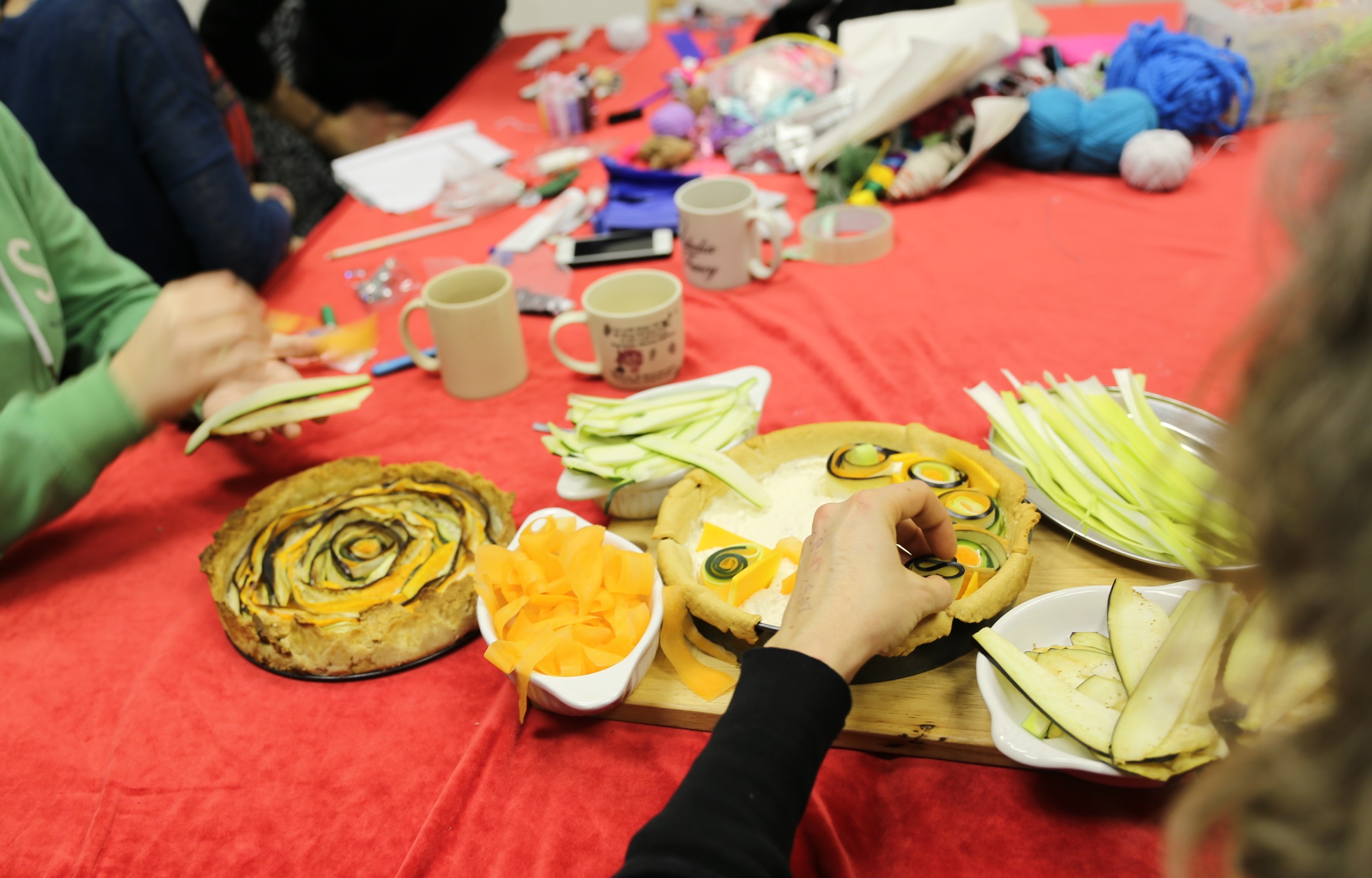
A Place at the Table drop-in session
Food for thought
To mark Eating Disorders Awareness Week, Sarah Pickthall and Maria Pattinson explain how they use art, food and conversation to help young people struggling with issues of self-esteem and body image.
It’s not news that our society has become obsessed with food – there is something to tempt the taste buds on every street corner, juxtaposed with every diet regime under the sun available through our digital devices. This situation has become particularly problematic for young people who grow up wrestling with this contradiction in a nation with the highest rate of eating disorders and self-harm in Europe.
Both of us are experienced artists, coaches and Mental Health First Aid (MHFA) instructors and together we developed The Pantry Project to address this conundrum. Over the last five years, we have been working alongside professional artists from a range of fine art, performance and culinary disciplines, running participatory immersive arts events for young people from all walks of life. These events are either commissioned by respite care breaks, or by other arts organisations and voluntary groups to meet the needs of young people who – for whatever reason – struggle with self-esteem, body image, mood and food.
this approach has been demonstrated to positively affect their self-confidence and their emotional resilience at times of increased stress
The Pantry Project is interested in the questions and conversations that arise when using foodstuffs as art materials as well as everyday ingredients, and how this can provoke open and non-judgmental discussion about the fundamental questions that many young people wrestle with: Who am I? What matters to me? How am I seen and how do I see others? How can I feel better?
Each art session involves touching, tasting, examining and detailing the colour, shape, texture – often at microscopic levels – of a range of foods. No foods are labelled as good or bad. Instead food becomes a starting point for tapping into ‘what’s inside’ as we naturally transfer visceral sensations and our memories into markings and makings, which hold charge of our thoughts and feelings as we work together as a culinary creative ensemble.
The ‘we’ is important here: we employ artists of national and international repute in our work, all of whom receive MHFA youth training. The artists also gain valuable experience in working with a diverse range of young people in applied arts settings, alongside gatekeepers of services, parents and carers and those running other voluntary schemes and respite care breaks.
The work is intensely personal and safe. For the young people we work with, this approach has been demonstrated to positively affect their self-confidence and their emotional resilience at times of increased stress.
On 23 February we opened our doors to mark the start of Eating Disorders Awareness Week 2015. We are showcasing the artistic and digital adventures of the 20+ young people we have worked with over the last year for our ‘A Place at the Table’ programme, which is funded by Big Lottery: Chances for Change and Arts Council England.
A Place at the Table has delivered a three-layered table-top light box containing artwork reflecting three sittings: soup, mains and dessert. Designed by Pantry artist Jenny Staff, it became the focus of a Fun Palace in October 2014 at Aspex Gallery in Portsmouth, relating food to the science of digestion, taste and discernment. The tabletop is both functional and a metaphor for the complex and multi-layered selves that created it. As with all the art work made through a Place at the Table, it is eye-catching, inviting the viewer to linger and look at the stories – sometimes obvious, sometimes hidden – within the work.
There is real pride in the beauty and delicacy of the art that comes from working with natural ingredients and the conversations that come out of this process. It teaches young people and us, the artists and chefs working with them, to respect our own delicate complex and sometimes fragile natures. It also connects us to the natural world and to each other. And, thanks to the culinary skills of young chef Jasia Lisicki, we eat great food together too – a rare thing for many of the young people who sit with us.
Since January we have extended the project to explore themes of fragility, comfort and personal safety in regular weekly drop-ins at our studio in Brighton. A core group of young adults have been fully engaged with the work and have felt its impact, and now they want to run their own pop-up Pantry Project sessions using their art and digital creations as metaphors in the housing and youth centres that are their ‘homes’.
Our future plans include supporting creative peer-to-peer training sessions so that many more young people will be able to benefit from the research we have been doing and sustaining our drop ins. Judging from the response to our open-studio event, there will be many more openings of the Pantry Project doors in the coming months.
Sarah Pickthall and Maria Pattinson are Co-Directors of The Pantry Project.
www.thepantryproject.co.uk
Join the Discussion
You must be logged in to post a comment.